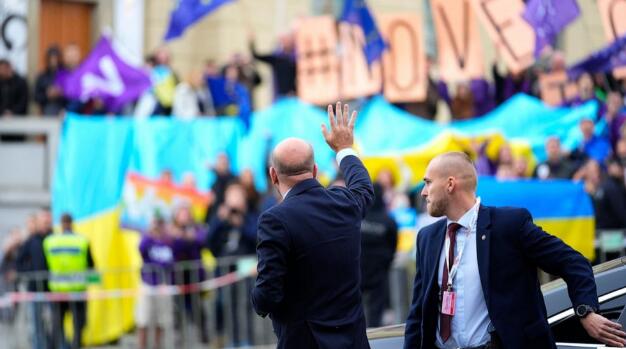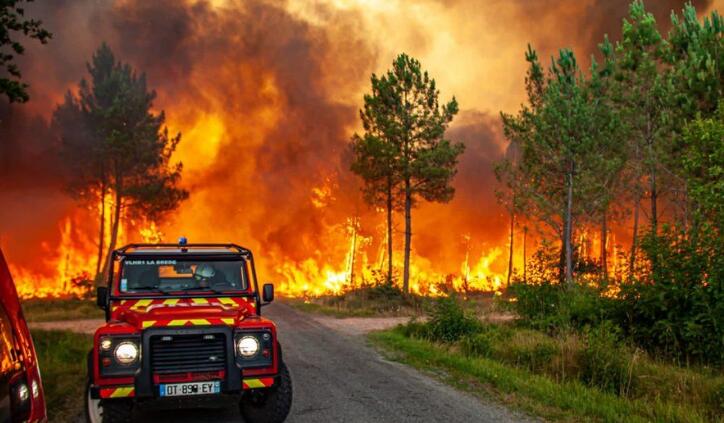PRAGUE — European Union leaders struggled Friday to bridge significant differences over a natural gas price cap as winter approaches and Russia’s war in Ukraine fuels a major energy crisis, driving up prices for consumers and businesses.
The price cap is one of several measures the 27-nation bloc is preparing to contain an energy crisis in Europe that some fear could lead to rolling blackouts, factory shutdowns and a deep recession over the winter in economies already weakened by the coronavirus pandemic.
Russia has reduced or cut off natural gas supplies to 13 EU member nations as European governments bolster their support for Ukraine in the form of weapons, money, aid and sanctions on Moscow. The potential for shortages has led to surging gas and electricity prices that could climb higher as demand peaks during the cold months.
“Russia has fired an energy missile at the European continent and the world,” European Council President Charles Michel said as the leaders met in Prague.
No breakthrough emerged from the summit, but Michel said the meeting was an important “strategic step” that he hoped might soon lead to a deal.
Standing in the way of an agreement was the simple fact that each member country depends on different energy sources and suppliers, and they’re struggling to see eye-to-eye on the best way ahead.
Latvian Prime Minister Krisjanis Karins summed up the challenge for the EU as it considers a possible gas-price ceiling.
“A price cap on gas, if that could be achieved, would be grand — with the caveat that we cannot endanger security of supply,” Karins said. “So we cannot set the price so that no one would sell gas into Europe.”
In a choreographed display of unity, French President Emmanuel Macron, Dutch Prime Minister Mark Rutte and German Chancellor Olaf Scholz entered Prague Castle together on foot, walking past a small but noisy crowd of pro-Ukraine demonstrators.
A group of 15 member countries has urged the EU’s executive branch, the European Commission, to propose a cap on gas prices as soon as possible, but the idea has not secured unanimous support, with Germany notably blocking.
Scholz’s government is also annoying some of its fellow EU members. Polish Prime Minister Mateusz Morawiecki criticized Germany’s plan to spend up to 200 billion euros (dollars) to help keep gas prices low for its own consumers and businesses.
“The richest EU state with a strong economy is trying to use the crisis to get a competitive advantage for its businesses. That’s not fair. The common market can’t function in this way,” Morawiecki said. Many, including France and Italy, think the move should have been coordinated with them or that EU money should be used instead.
For now, the commission says, Europe’s gas storage capacity stands at about 90%, even as Russian gas supplies to the EU declined by 37% between January and August, with the U.S. and Norway stepping in to provide liquefied natural gas. But those replacement supplies have not been cheap.
Commission President Ursula von der Leyen said the talks in the Czech capital focused on cutting high gas and electricity prices, negotiating a corridor for decent prices with more reliable suppliers and on limiting prices in the gas market overall.
“There is a broad support that next spring, at end of the winter when our storages will be depleted, it is of paramount importance that we have a joint procurement of gas, so that we avoid to outbid each other but that we have collective bargaining power,” von der Leyen said.
For now, a breakthrough on the price cap seems a distant prospect. But EU energy ministers meet again next week and may make enough progress to close in on some kind of agreement for when the leaders meet again in Brussels on Oct 20-21.
The gas cap proposal faces hurdles “because each country has its own version of what the gas cap should look like,” said Simone Tagliapietra, an energy policy expert at the Bruegel think-tank in Brussels.
And there are more fundamental problems, including the need to cut demand: “The key issue at stake is, can we cap the price of gas without reducing the incentive to reduce gas use,” Tagliapietra said.
For all its difficulties, sealing a deal on gas is another core element of resisting what the Europeans believe to be Russia’s manipulation of the energy markets in an attempt to weaken their resolve to support conflict-ravaged Ukraine.
The EU agreed to a new package of sanctions against Russia on Thursday, hitting trade, notably in the tech sector, slapping travel bans and asset freezes on 30 more officials, and targeting seven organizations. But the bloc is running out of economic ammunition to punish Russia with.



